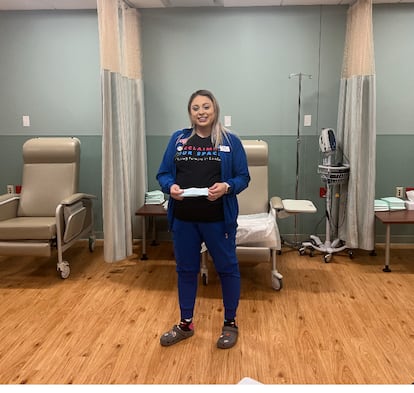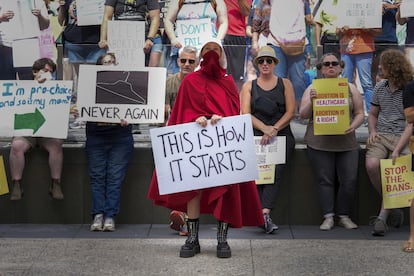The war against abortion in the US: A state-by-state battle
EL PAÍS traveled across the Midwest, from the tolerant state of Illinois to Missouri, where abortion is already banned, to Iowa, whose fate is still undetermined


The Joseph F. Rosenfield Reproductive Health Clinic in Des Moines is like a domino tile that is still standing but could topple at any moment. Abortion is still legal in Iowa up until 20 weeks post-fertilization, but the state governor, Republican Kim Reynolds, announced last week that she will do everything possible to end this. She’s racing to align the state’s abortion policies with the recent Supreme Court ruling that overturned Roe v. Wade, the 1973 ruling that gave constitutional status to that right. Her decision does not coincide with the majority opinion reflected in the polls, but with the high court’s decision to return the power to individual states to regulate abortion. Indeed, it is estimated that 26 of the 50 states will ban it.
While Washington is still in a political-judicial stalemate, the war over women’s reproductive health is now being waged from state to state. Last week, organizations that defend “the right to choose” challenged legislation in 11 states and managed to stop them in four. Among this confusion stands the vast and predominantly conservative Midwest region, where some of the most rigorous battles between the two sides are being fought.
In Iowa there is a law, blocked by judges, that would lower the limit to six weeks, which in practice looks a lot like a prohibition. Reynolds, who is fighting for her position in the November elections, has already managed to pass a law that requires women, both for surgical abortions and for the administration of pills, to attend two doctor’s appointments with at least 24 hours between them. In the first, the patient must sign a consent form, receive information about alternatives to termination, have an ultrasound scan, and be given the option to see it. In the second, the procedure can be carried out or the woman may be administered pills. This proposal is designed to urge pregnant women to reconsider their decision. But Elizabeth Nash, from the Guttmacher Institute, an independent research organization in the United States, warns that, according to her studies, “92% do not need to think twice: They have made their decision beforehand.”

Megan Amato, a registered nurse who has been working at the Des Moines center for 15 years, explained last week that the legislative reform presented a logistical nightmare for workers to relocate patients who had already made an appointment. Like most of the sexual and reproductive health clinics across the United States, the Des Moines center belongs to the Planned Parenthood network. “It’s just another way to stop us from doing our job,” she said. The director, Jordawn Williams, added that the victims of this reform will be largely those women who are forced to travel miles to receive the attention they are denied at home. Iowa borders three of the seven states (Wisconsin, South Dakota, and Missouri) that have already banned abortion outright in the last week, so the Rosenfield clinic (one of seven Planned Parenthood centers in Iowa, of which only two, this one included, provide surgical abortions) has become a test case in the Midwest.
Women are arriving here from all over the country. An anonymous doctor from the center spoke with EL PAÍS and revealed that she had just treated a patient from New Orleans who had travelled some 990 miles. Since this woman could afford it, she inquired at clinics state by state, until she received the first available appointment in Iowa.
Women have travelled from states such as Texas and Oklahoma - where restrictive laws have begun to take effect - to the Des Moines center, and others throughout the country. The center’s director calculated that on a single day last week they treated a record number of 42 patients. “Those who lack resources and can’t afford a hotel, drive for hours,” she explained. She gave an example of a woman, who represents a great many in the US, forced to undertake long trips: this woman lives in Dubuque (Iowa) and traveled three hours for her first consultation (and a further three hours for her return trip). Two days later, she had to travel a further six hours for the second appointment.

If the Des Moines domino topples, the pressure that the center is now under will shift to places where abortion remains legal, in particular, to Illinois. Neighboring to the east, this has become an island of tolerance in post-Roe America, surrounded by states where abortion is already banned, will soon be banned, or where restrictions are about to be brought in.
A five-hour highway drive separates Des Moines from Flossmoor, south of Chicago, where one of Illinois’ 29 abortion clinics is located. Staff there are reportedly working around the clock, EL PAÍS was informed in the health center by Mary Jane Maharry, from the Planned Parenthood affiliate in that state. The peace in this quiet suburb is disturbed every morning by anti-abortion activists who protest “in groups of at least five,” says the pregnant assistant Beatriz González, who posed for a photo in the recovery room, where the patients rest for 45 minutes after the quick intervention.

Planned Parenthood has 17 centers in Illinois, where abortion has been covered by social security (Medicaid) since 2017. They receive some 60,000 patients annually and have been preparing, says Maharry, “since 2016, when Donald Trump came to power,” for what they saw coming: that the most conservative Supreme Court in eight decades, established by the former president and in collaboration with Mitch McConnell, leader of the Republican party in the Senate, would work to remove a right that women in the United States had exercised for half a century. In the past they saw around 1,000 out-of-state patients, according to Maharry. Now they expect “between 20,000 and 30,000 a year.” “We started seeing a dramatic increase since Texas passed this law in September,” she explains. “Our online appointment search went crazy between Friday and Saturday. And on the day of the ruling [June 24] we received twice as many calls as usual.”
The Flossmoor center opened in 2018. In 2020, they opened another to the north, in Waukegan, to accommodate women from neighboring Wisconsin, where abortion is prohibited. The clinic that receives the most pressure in the state of Illinois belongs to the Planned Parenthood affiliate for the Southwest Region of Missouri. Located in Fairview Heights, it is 12 miles (20km) from St. Louis, on the other side of the Mississippi River border.

Yamelsie Rodríguez, the president of the affiliate that runs the clinic, explained that, before the Missouri attorney general rushed to ban abortion following the ruling (it took around 20 minutes), the Saint Louis clinic had seen some 1.3 million women of reproductive age. Now these women will be treated on the other side of the border, in facilities that “opened in 2019 strategically and discreetly.” During the legislative period that is now ending, Rodríguez recalls, Missouri tried to pass a law that would prohibit patients from traveling to another state for intervention. “They did not succeed, but they have warned that they will try again in due course,” she adds.
And they are certainly not the only ones: preventing this exodus is one of the objectives of the anti-abortion movement in the United States. A story last week in The Washington Post claims that a conservative Chicago law firm, Thomas More Society, has prepared a model legislation which it will make available to states that require it. Inspired by Texas law, it invites citizens to sue anyone who assists a woman to travel for a termination. The Department of Justice confirmed that it will contest these regulations, and the issue was addressed in the Supreme Court ruling that repealed abortion. Conservative Justice Brett Kavanaugh considered this an obscure controversy. He wondered if these prohibitions are legitimate. “In my opinion,” he said, “based on the constitutional right to interstate travel, the answer is no.” Of the 52,780 abortions that, according to the Guttmacher Institute claim were performed in 2020 in Illinois, about one in five women had travelled from another state.
Rodríguez does not intend, however, to sit and wait for more restrictions to be imposed, given that the Republicans are no longer hiding their aspiration to pass a law that prohibits abortion at a federal level. The clinic her affiliate runs expects 14,000 more patients this year (in addition to the 8,000 they see on average). “We now open six days a week, but in order to absorb the demand we will expand to seven days; we also plan to increase the number of service providers and are working with the governor of Illinois [Democrat J. B. Pritzker] to pass a law that allows qualified nurses to prescribe abortion medications,” she warns.
As for abortion pills, which were used in half of the terminations in 2020 in the United States (again, according to the Guttmacher Institute) – there is also a war going on. Compared to places such as Illinois, where a remote consultation is enough (although to receive medications by return mail you must order them from a phone or from a computer whose IP is recorded within the state), in Iowa the entire process must be face-to-face. Pills are banned in places such as Missouri and South Dakota, where a law came into effect on Friday that threatens serious penalties for those who prescribe abortion drugs without a license from local authorities. This rule is designed to prevent doctors from other states treating South Dakota patients. In response to this measure, Planned Parenthood clinics in Montana, a neighbor to the north, have announced that they will require applicants to prove residency, to avoid putting their doctors in legal trouble.

The anonymous doctor from Des Moines explained that they too are under enormous pressure. On top of what is already an ordeal (many, like herself, do not live in the same town where they work to avoid problems), the threat of committing a crime and the dilemma of having to choose between obeying the law or the Hippocratic Oath is now a reality in the most restrictive states. “There are already stories of women coming in with ectopic pregnancies, and to intervene, doctors must prove that they are unstable and that their blood pressure has dropped dramatically before they can be treated. Otherwise, they risk prison,” she explained. The exceptions, governed by specific laws, such as rape or incest are also problematic. Women must first file a police report to access a legal and safe abortion. Many of the victims of these new laws are undocumented immigrants who fear deportation if they go to the authorities.
Despite everything, the doctor says that this is the most rewarding job she’s ever had. “When they come to me, patients are faced with a vital dilemma. I help them take control over their future. And that happens many times a day,” she says. “The idea of a future where you can’t do this anymore, where your hands are tied, is really heartbreaking.” She says she is optimistic and can only hope that the Iowa domino tile will continue to stand strong and will not topple.
Edited by Xanthe Holloway.
Tu suscripción se está usando en otro dispositivo
¿Quieres añadir otro usuario a tu suscripción?
Si continúas leyendo en este dispositivo, no se podrá leer en el otro.
FlechaTu suscripción se está usando en otro dispositivo y solo puedes acceder a EL PAÍS desde un dispositivo a la vez.
Si quieres compartir tu cuenta, cambia tu suscripción a la modalidad Premium, así podrás añadir otro usuario. Cada uno accederá con su propia cuenta de email, lo que os permitirá personalizar vuestra experiencia en EL PAÍS.
¿Tienes una suscripción de empresa? Accede aquí para contratar más cuentas.
En el caso de no saber quién está usando tu cuenta, te recomendamos cambiar tu contraseña aquí.
Si decides continuar compartiendo tu cuenta, este mensaje se mostrará en tu dispositivo y en el de la otra persona que está usando tu cuenta de forma indefinida, afectando a tu experiencia de lectura. Puedes consultar aquí los términos y condiciones de la suscripción digital.








































